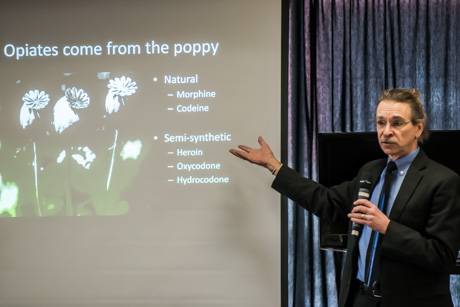There is a lot of attention paid to opioid addiction treatment, Dr. Richard Blondell told an audience at the City Church Generation Center in Batavia today, but not enough effort is given to preventing addiction in the first place.
"The bottom line of this opioid epidemic is we cannot treat our way out of this epidemic," Blondell said. "We cannot incarcerate out of this epidemic. We can't legislate our way out of this epidemic. What we really have to do is prevention."
Blondell is vice chair of addiction medicine and a professor in the Department of Family Medicine at SUNY Buffalo. He spoke today at a workshop for faith leaders sponsored by the Genesee-Orleans-Wyoming Opioid Task Force.
Drawing on science, history and statistics, Blondell made the case that it's very difficult to successfully treat somebody for opioid addiction; therefore, to end the current epidemic, society needs to produce fewer addicts.
That begins with doctors, he said but includes families and individuals who need to be more aware and better educated about addiction and prevention.
The causes of addiction are both genetic and environmental, Blondell said.
About 10 percent of the population is genetically susceptible to opioid addiction. Those people, when exposed to opioids, usually through prescription medication, are much likely to become addicts.
The addiction for them is a disease.
An addict has about a 5 percent chance of dying in any given year.
"The average life expectancy of a heroin addict is about 10 years, most are gone in 20," Blondell said.
Much of the blame for the opioid epidemic can be placed on Arthur M. Sackler, a medical marketing executive in the 1950s who, among other things, introduced the world to Valium, the first multimillion drug.
"It didn't treat anything actually," Bondell said. "Even though Valium was the number one prescribed drug in the country it was not clear what disease it treated."
The Sackler family went on to own Perdue Pharma, the company that introduced OxyContin.
That pain pill was sold to doctors as non-addictive if used for pain.
Then the insurance companies got involved, Blondell said. They stopped funding pain-management regimes, which could cost thousands of dollars but were effective, in favor of prescription pain medications. And if doctors didn't prescribe enough pain pills, they would get low patient satisfaction scores from patients who said, "he didn't do anything for my pain."
Doctors started prescribing opioid-based pain medications "like skittles," Blondell said.
Patients who become addicted to pain pills often, usually, turn to heroin, which is cheaper and easier to get. About 75 percent of heroin addicts started with a prescription to either the addict himself or to a friend or family member.
There are two types of treatment for addicts, neither high success rates -- counseling or medication.
In counseling, an addict receives psychological therapy, or they might live in a home and where they can learn adult life skills but if they are physically addicted, brain condition related to addiction is not treated. That is where medication, such as methadone, come in.
Blondell said all treatment methods should continue but that isn't the final answer on the epidemic. We've never treated our way out of an epidemic, he said.
People who say addiction is a choice really don't understand opioid addiction, Blondell said.
Everybody is addicted to something. Addiction is essential to survival. We're all addicted, for example, to water.
But what substances, such as illicit drugs and alcohol do, is trick the brain into thinking that substance is a higher priority than other addictions, such as food.
"So people say to me, this is a behavior," Blondell said. "It's not really a mental illness or it's not a disease. It's not a disorder. It's really just a behavioral problem. To which my question is, what organ in the body produces behavior? Is it the kidneys? Is it the liver? No, it's the brain. So it's the brain that produces the behavior that we see and pass judgment on."
If we're going to end the epidemic, Blondell said, doctors need to be more cautious and judicious in when and how they prescribe pain medications. Patients who receive them need to be better educated about taking the prescribed amount for only a short period of time. Parents need to ensure they control the distribution of pain medication to their teen children, and ensure they actually take them when dispensed so they're not hoarded so five or six can be taken at a time. Everybody needs to be better educated about the nature of addiction and how to avoid it.

